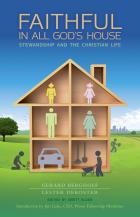 In Faithful in All God’s House: Stewardship and the Christian Life, Lester DeKoster and Gerard Berghoef explore the range and reach of Christian stewardship, emphasizing that the practice of stewardship extends far beyond the handling of our money, stretching into life and time and destiny.
In Faithful in All God’s House: Stewardship and the Christian Life, Lester DeKoster and Gerard Berghoef explore the range and reach of Christian stewardship, emphasizing that the practice of stewardship extends far beyond the handling of our money, stretching into life and time and destiny.
The practice of stewardship is “the supreme challenge of the Christian life,” they argue, and thus, we must strive to properly orient our thinking and behavior accordingly. The forms of stewardship are submitted to all of us. “None is beyond our reach — if the heart is aware, and the will bent to do God’s service wherever and whenever.”
Such awareness begins with a basic understanding of the fundamentals of stewardship, and DeKoster and Berghoef set forth five distinct principles to help lay the groundwork for their discussion. These principles, as revealed in Scripture, are summarized as follows:
- God creates, sustains, and thus owns all things — man included. Not only in the beginning, but always. Every child born into the world receives life from God.
- God brings us to life within this vast, beautiful, and challenging world and permits us to use and enjoy all that he sustains.
- He intends, however, that his will shall govern our wills and his desires shall control our desires. He reveals his will in inspired Scripture. As we walk in his world, his word is a lamp to our feet and a light for our paths (Ps. 119:105).
- Our use of God’s property, whether as faithful or rebellious stewards, is, therefore, what life is all about.
- Our obedience, or disobedience, to God’s will revealed in his Word becomes the basis for the last judgment, which is the prelude to heaven or hell.
For more, see Faithful in All God’s House: Stewardship and the Christian Life.
To join the On Call in Culture community, like us on Facebook or follow us on Twitter.

